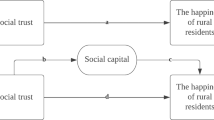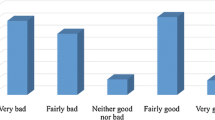Abstract
Using data from the World Values Survey, this study examines the associations among trust, social networks and subjective wellbeing in China. We address the endogenous nature of trust and social networks, and examine how these elements of social capital affect subjective wellbeing. We also explore the interplay between trust and social networks. Existing literature suggests that trust and social networks positively impact wellbeing, with one strand of the literature suggesting that in developed countries social capital is a stronger determinant of wellbeing than income. However, we find that this is not the case for China (a developing country) where the effects of trust and social networks on wellbeing are found to be relatively weaker compared to the effect of income.
Similar content being viewed by others
Notes
For details on the WVS data, see www.worldvaluessurvey.org.
References
Alesina, A., Devleeschauwer, A., Easterly, W., Kurlat, S., & Wacziarg, R. (2003). Fractionalization. Journal of Economic Growth, 8(2), 155–194.
Alesina, A., & Zhuravskaya, E. (2011). Segregation and the quality of government in a cross section of countries. American Economic Review, 101(5), 1872–1911. doi:10.1257/aer.101.5.1872.
Arrow, K. J. (1972). Gifts and Exchanges. Philosophy and Public Affairs, 1(4), 343–362. doi:10.2307/2265097.
Banfield, E. C. (1958). The moral basis of a backward society. New York: Free Press.
Biswas-Diener, R., & Diener, E. (2006). The subjective well-being of the homeless, and lessons for happiness. Social Indicators Research, 76(2), 185–205.
Bjørnskov, C. (2003). The happy few: Cross-country evidence on social capital and life satisfaction. Kyklos, 56(1), 3–16. doi:10.1111/1467-6435.00207.
Bjørnskov, C. (2006). The multiple facets of social capital. European Journal of Political Economy, 22(1), 22–40. doi:10.1016/j.ejpoleco.2005.05.006.
Bjørnskov, C. (2008). Social capital and happiness in the United States. Applied Research in Quality of Life, 3(1), 43–62.
Boisot, M., & Child, J. (1996). From fiefs to clans and network capitalism: Explaining China’s emerging economic order. Administrative Science Quarterly, 41(4), 600–628. doi:10.2307/2393869.
Camfield, L., Choudhury, K., & Devine, J. (2006). Relationships, happiness, and wellbeing: Insights from Bangladesh. Wellbeing in Developing Countries (WeD) Working Paper (14). Bath, UK: ESRC Research Group on Wellbeing in Developing Countries.
Chang, W. C. (2009). Social capital and subjective happiness in Taiwan. International Journal of Social Economics, 36(8), 844–868. doi:10.1108/03068290910967118.
Coleman, J. S. (1988). Social capital in the creation of human capital. American Journal of Sociology, 94, S95–S120. doi:10.2307/2780243.
Coleman, J. S. (1990). Foundations of social theory. Cambridge, MA: Harvard University Press.
Cox, E. (2000). Creating a more civil society: Community level indicators of social capital. Just Policy: A Journal of Australian Social Policy, 19(20), 100–107.
Diener, E. (2009). The science of subjective well-being: The collected works of Ed Diener. New York: Springer.
Diener, E., Oishi, S., & Lucas, R. E. (2009). Subjective well-being: The science of happiness and life satisfaction. Oxford Handbook of Positive Psychology, 2, 187–194.
Easterlin, R. A. (1974). Does economic growth improve the human lot? Some empirical evidence. Nations and Households in Economic Growth, 89, 89–125.
Easterlin, R. A. (1995). Will raising the incomes of all increase the happiness of all? Journal of Economic Behavior and Organization, 27(1), 35–47.
Easterly, W., & Levine, R. (1997). Africa’s growth tragedy: Policies and ethnic divisions. The Quarterly Journal of Economics, 112(4), 1203–1250.
Elgar, F. J., Davis, C. G., Wohl, M. J., Trites, S. J., Zelenski, J. M., & Martin, M. S. (2011). Social capital, health and life satisfaction in 50 countries. Health and Place, 17(5), 1044–1053. doi:10.1016/j.healthplace.2011.06.010.
Ellison, C. G. (1991). Religious involvement and subjective well-being. Journal of Health and Social Behavior, 32(1), 80–99. doi:10.2307/2136801.
Fearon, J. (2003). Ethnic and cultural diversity by country*. Journal of Economic Growth, 8(2), 195–222. doi:10.1023/A:1024419522867.
Field, J. (2003). Social capital. London: Routledge.
Helliwell, J. F. (2003). How’s life? Combining individual and national variables to explain subjective well-being. Economic Modelling, 20(2), 331–360.
Helliwell, J. F. (2006). Well-being, social capital and public policy: What’s new? The Economic Journal, 116(510), C34–C45.
Helliwell, J. F., & Putnam, R. D. (2004). The social context of well-being. Philosophical Transactions of the Royal Society, 359, 1435–1446.
Helliwell, J. F., & Wang, S. (2011). Trust and wellbeing. International Journal of Wellbeing, 1(1), 42–78.
Ingersoll-Dayton, B., Morgan, D., & Antonucci, T. (1997). The effects of positive and negative social exchanges on aging adults. The Journals of Gerontology Series B: Psychological Sciences and Social Sciences, 52(4), S190–S199.
Inglehart, R., & Klingemann, H. D. (2009). Genes, culture, democracy, and happiness. In E. D. E. M. Suh (Ed.), Culture and subjective well-being. Cambridge: MIT Press.
Jack, G., & Jordan, B. (1999). Social capital and child welfare. Children and Society, 13(4), 242–256.
Klein, C. (2013). Social capital or social cohesion: What matters for subjective well-being? Social Indicators Research, 110(3), 891–911.
Kozma, A., Stones, M. J., & McNeil, J. K. (1991). Psychological well-being in later life. Toronto: Harcourt Brace.
Lewbel, A. (2012). Using heteroscedasticity to identify and estimate mismeasured and endogenous regressor models. Journal of Business and Economic Statistics, 30(1), 67–80.
Li, S. (2004). The puzzle of firm performance in China: An institutional explanation. Economics of Planning, 37(1), 47–68.
Li, S., Li, S., & Zhang, W. (2000). The road to capitalism: Competition and institutional change in China. Journal of Comparative Economics, 28(2), 269–292.
Maslow, A. H. (1943). A theory of human motivation. Psychological Review, 50(4), 370.
Morrow, V. (1999). Conceptualising social capital in relation to the well-being of children and young people: A critical review. The Sociological Review, 47(4), 744–765. doi:10.1111/1467-954X.00194.
Nee, V. (1992). Organizational dynamics of market transition: Hybrid forms, property rights, and mixed economy in China. Administrative Science Quarterly, 37(1), 1–27. doi:10.2307/2393531.
Onyx, J., & Bullen, P. (2000). Measuring social capital in five communities. The Journal of Applied Behavioral Science, 36(1), 23–42. doi:10.1177/0021886300361002.
Pinquart, M., & Sörensen, S. (2000). Influences of socioeconomic status, social network, and competence on subjective well-being in later life: A meta-analysis. Psychology and Aging, 15(2), 187.
Portela, M., Neira, I., & del Mar Salinas-Jiménez, M. (2013). Social capital and subjective wellbeing in Europe: A new approach on social capital. Social Indicators Research, 114(2), 493–511.
Portes, A. (1998). Social capital: Its origins and applications in modern sociology. Annual Review of Sociology, 24(1), 1–24. doi:10.1146/annurev.soc.24.1.1.
Portes, A. (2000). The two meanings of social capital. Sociological Forum, 15(1), 1–12. doi:10.2307/3070334.
Pugno, M. (2009). The Easterlin paradox and the decline of social capital: An integrated explanation. The Journal of Socio-Economics, 38(4), 590–600.
Putnam, R. D. (2000). Bowling alone: The collapse and revival of American community. New York: Simon and Schuster.
Ram, R. (2010). Social capital and happiness: Additional cross-country evidence. Journal of Happiness Studies, 11(4), 409–418. doi:10.1007/s10902-009-9148-3.
Rosenberg, M. (1979). Conceiving the self. New York: Basic Books.
Sarracino, F. (2010). Social capital and subjective well-being trends: Comparing 11 western European countries. The Journal of Socio-Economics, 39(4), 482–517.
Sonnentag, S., Unger, D., & Nägel, I. J. (2013). Workplace conflict and employee well-being. International Journal of Conflict Management, 24(2), 166–183. doi:10.1108/10444061311316780.
Uslaner, E. M. (1999). Democracy and social capital. In M. E. Warren (Ed.), Democracy and trust (pp. 121–150). New York: Cambridge University Press.
Walder, A. G. (1995). Local governments as industrial firms: An organizational analysis of China’s transitional economy. American Journal of Sociology, 101(2), 263–301. doi:10.2307/2782429.
Wang, Z.-H., Zeng, H.-L., Wei, Y.-M., & Zhang, Y.-X. (2012). Regional total factor energy efficiency: An empirical analysis of industrial sector in China. Applied Energy, 97, 115–123. doi:10.1016/j.apenergy.2011.12.071.
Yip, W., Subramanian, S. V., Mitchell, A. D., Lee, D. T. S., Wang, J., & Kawachi, I. (2007). Does social capital enhance health and well-being? Evidence from rural China. Social Science and Medicine, 64(1), 35–49. doi:10.1016/j.socscimed.2006.08.027.
Author information
Authors and Affiliations
Corresponding author
Rights and permissions
About this article
Cite this article
Awaworyi Churchill, S., Mishra, V. Trust, Social Networks and Subjective Wellbeing in China. Soc Indic Res 132, 313–339 (2017). https://doi.org/10.1007/s11205-015-1220-2
Accepted:
Published:
Issue Date:
DOI: https://doi.org/10.1007/s11205-015-1220-2




